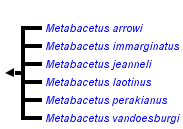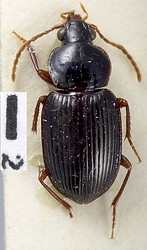Metabacetus
Kipling Will


This tree diagram shows the relationships between several groups of organisms.
The root of the current tree connects the organisms featured in this tree to their containing group and the rest of the Tree of Life. The basal branching point in the tree represents the ancestor of the other groups in the tree. This ancestor diversified over time into several descendent subgroups, which are represented as internal nodes and terminal taxa to the right.

You can click on the root to travel down the Tree of Life all the way to the root of all Life, and you can click on the names of descendent subgroups to travel up the Tree of Life all the way to individual species.
For more information on ToL tree formatting, please see Interpreting the Tree or Classification. To learn more about phylogenetic trees, please visit our Phylogenetic Biology pages.
close boxIntroduction
Metabacetus is a small and rather obscure group of species in the Oriental and Pacific region. There are few specimens in collections and little is known about their habits. Metabacetus vandoesburgi was collected in very wet forest while headlamp searching the ground at night in Sabah (K.Will). Recent study of types and available material (K. Will unpublished) suggests that there are many undescribed species to be discovered but more specimens are needed before the study of this group can continue.
Characteristics
These species lack the most obvious characteristics and likely synapomorphies for Abacetus and its near relatives–the eccentrically inserted second antennomere and the strongly transverse mentum. But they share with other abacetines the lack of the angular base of stria 1; a single pair of deeply impressed, linear basal impressions of the pronotum; deeply impressed, elongate frontal impressions on the head; sinuate anterior coxal sulcus and coiled spermatheca.
Metabacetus vandoesburgi has small apical spines on the elytra, which is very unusual for an abacetine, though known from many platynines and some caelostomines.
Discussion of Phylogenetic Relationships
Although none of these characteristics mentioned above represent unique synapomorphies, i.e., all are found in other pterostichine-grade taxa (Will 2002), and several are certainly plesiomorphic, in combination they define a cluster of taxa including some members of Jeannel’s Celioschesini (1948), Moore’s abacetine series (1965) and various taxa classified in Pterostichini from Asia and Africa. The exact composition of this set of taxa is still unclear, however, current studies of both morphological and molecular characters (Will unpublished) suggest that there is a monophyletic group that includes taxa such as Metabacetus, Aristopus, Cosmodiscus, Tiferonia and Mateuellus.
Title Illustrations

| Scientific Name | Metabacetu arrowi |
|---|---|
| Identified By | K.Will |
| Life Cycle Stage | Adult |
| Image Use |
 This media file is licensed under the Creative Commons Attribution License - Version 3.0. This media file is licensed under the Creative Commons Attribution License - Version 3.0.
|
| Copyright |
© Kipling Will

|
About This Page
Kipling Will

University of California, Berkeley, California, USA
Correspondence regarding this page should be directed to Kipling Will at
Page copyright © 2006 Kipling Will
 Page: Tree of Life
Metabacetus.
Authored by
Kipling Will.
The TEXT of this page is licensed under the
Creative Commons Attribution License - Version 3.0. Note that images and other media
featured on this page are each governed by their own license, and they may or may not be available
for reuse. Click on an image or a media link to access the media data window, which provides the
relevant licensing information. For the general terms and conditions of ToL material reuse and
redistribution, please see the Tree of Life Copyright
Policies.
Page: Tree of Life
Metabacetus.
Authored by
Kipling Will.
The TEXT of this page is licensed under the
Creative Commons Attribution License - Version 3.0. Note that images and other media
featured on this page are each governed by their own license, and they may or may not be available
for reuse. Click on an image or a media link to access the media data window, which provides the
relevant licensing information. For the general terms and conditions of ToL material reuse and
redistribution, please see the Tree of Life Copyright
Policies.
- First online 07 July 2006
- Content changed 07 July 2006
Citing this page:
Will, Kipling. 2006. Metabacetus. Version 07 July 2006 (under construction). http://tolweb.org/Metabacetus/51314/2006.07.07 in The Tree of Life Web Project, http://tolweb.org/







 Go to quick links
Go to quick search
Go to navigation for this section of the ToL site
Go to detailed links for the ToL site
Go to quick links
Go to quick search
Go to navigation for this section of the ToL site
Go to detailed links for the ToL site